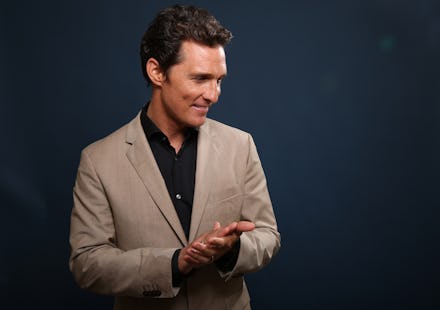Why Matthew McConaughey's "McConaissance" Will End With Oscar Gold

Méconnaissance (nf): French term meaning “ignorance,” “misreading” or “misrecognition”
McConaissance (n): American English term for the career resurgence of Matthew McConaughey, a Texas-born actor who suddenly decided to take his career seriously
The dichotomy between these is striking because on Sunday, Matthew McConaughey will probably win his first Academy Award.
The road to glory hasn’t been smooth: It took years of miscalculated career moves that confined the talented performer to perpetual rom-com lead status. He was George Clooney’s antithesis, sleepwalking through that effortless purgatory of charismatic Hollywood pretty boys who devour easy paychecks by the boatload. He was what Brad Pitt might’ve been. Then suddenly, everything changed.
Even McConaughey is unsure how it happened: “I didn’t just say, hey, line in the sand, I’m done with that, let’s begin with this,” he told the New York Times. “In a wild cyclical way I started to attract these other things.” Until about 2011, the actor’s work could be characterized as “one interminable in-flight movie” according to Dennis Lim: Sahara (2005), Failure to Launch (2006), Fool’s Gold (2008), Ghosts of Girlfriends Past (2009) – forgettable across the board, and in McConaughey’s own words, invariably “kind of boring.”
Then came The Lincoln Lawyer (2011), a solid legal thriller that showcased McConaughey’s fluency with world-weary gravitas, which he famously took to its logical extreme on HBO’s True Detective. But Magic Mike is where the magic started: His performance as a male stripping guru lionized his penchant for scene-stealing supporting roles, later replicated in Bernie and, most recently, The Wolf of Wall Street. Mike was also a well-timed parody of the actor’s hyper-sexualized onscreen persona. The McConaissance was upon us.
The rest is history: celebrated lead performances in Killer Joe (2011) and Mud (2012) were like witnessing a crapshooter on a roll – the Hollywood equivalent of Kobe’s 2006-07 stretch of 50+ point games. McConaughey was the pre-Cars Pixar of actors, and it was just a matter of time before Oscar came knocking.
Which brings us to Dallas Buyers’ Club. McConaughey’s turn as Ron Woodroof, a real-life rodeo regular who contracted AIDS and started smuggling unapproved meds from Mexico to sell to other victims, is an undeniable career cornerstone. His performance is masterfully realized and appropriately flamboyant. But most importantly, it is utterly free of leading man vanity.
The Academy eats this stuff up: The “pretty people un-prettying themselves” dynamic worked wonders for Nicole Kidman in The Hours (2002) and Charlize Theron in Monster (2003), who both won Best Actress for their efforts. In this case, McConaughey shed almost 40 pounds to play the emaciated Woodroof, employing the physical transformation scheme that won Robert DeNiro the prize for Raging Bull (1980). Other proven Academy goldmines embodied in his performance include playing a real person – which worked for Jamie Foxx in Ray, Philip Seymour Hoffman in Capote and Colin Firth in The King’s Speech – and dying at the end (Sean Penn in Milk and Daniel Day-Lew in Lincoln). This isn’t meant to disparage these actors’ impressive achievements, but to point out that Oscar tends to reward a specific type of performance, especially of late.
McConaughey’s fiercest competitor is the equally deserving Chiwetel Ejiofor in 12 Years a Slave, with Leonardo DiCaprio a close third in The Wolf of Wall Street. But at this point, it appears that the McConaissance has simply too much momentum to be stopped. An Oscar victory for McConaughey would be the crown jewel of a remarkable career turnaround, and an important affirmation of his hard work.
On Sunday, the world will find out if it really paid off.